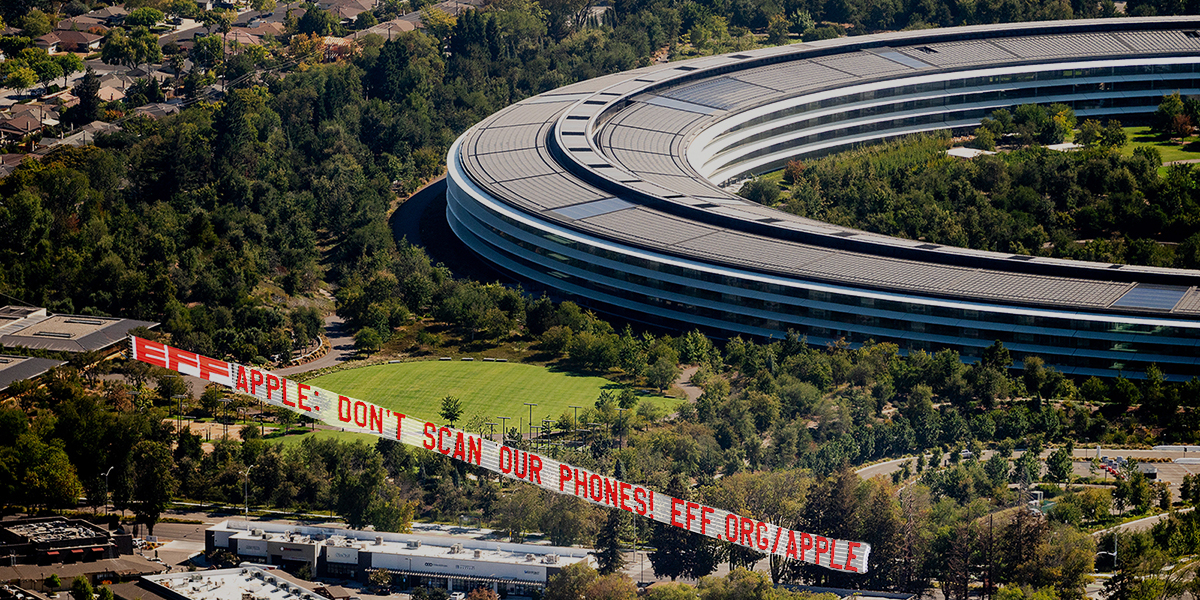For the last month, civil liberties and human rights organizations, researchers, and customers have demanded that Apple cancel its plan to install photo-scanning software onto devices. This software poses an enormous danger to privacy and security. Apple has heard the message, and announced that it would delay the system while consulting with various groups about its impact. But in order to trust Apple again, we need the company to commit to canceling this mass surveillance system.
The delay may well be a diversionary tactic. Every September, Apple holds one of its big product announcement events, where Apple executives detail the new devices and features coming out. Apple likely didn’t want concerns about the phone-scanning features to steal the spotlight.
But we can’t let Apple’s disastrous phone-scanning idea fade into the background, only to be announced with minimal changes down the road. To make sure Apple is listening to our concerns, EFF turned to an old-school messaging system: aerial advertising.

EFF banner flies over Apple Park, the corporate headquarters of Apple, located in Cupertino, California

EFF banner flies over the previous Apple headquarters
During Apple’s event, a plane circled the company’s headquarters carrying an impossible-to-miss message: Apple, don’t scan our phones! The evening before Apple’s event, protestors also rallied nationwide in front of Apple stores. The company needs to hear us, and not just dismiss the serious problems with its scanning plan. A delay is not a cancellation, and the company has also been dismissive of some concerns, referring to them as “confusion” about the new features.
Privacy Is Not For Sale
Apple’s iMessage is one of the preeminent end-to-end encrypted chat clients. End-to-end encryption is what allows users to exchange messages without having them intercepted and read by repressive governments, corporations, and other bad actors. We don’t support encryption for its own sake: we fight for it because encryption is one of the most powerful tools individuals have for maintaining their digital privacy and security in an increasingly insecure world.
Now that Apple’s September event is over, Apple must reach out to groups that have criticized it and seek a wider range of suggestions on how to deal with difficult problems, like protecting children online. EFF, for its part, will be holding an event with various groups that work in this space to share research and concerns that Apple and other tech companies should find useful. While Apple tends to announce big features without warning, that practice is a dangerous one when it comes to making sweeping changes to technology as essential as secure messaging.
The world, thankfully, has moved towards encrypted communications over the last two decades, not away from them, and that’s a good thing. If Apple wants to maintain its reputation as a pro-privacy company, it must continue to choose real end-to-end encryption over government demands to read user’s communication. Privacy matters now more than ever. It will continue to be a selling point and a distinguishing feature of some products and companies. For now, it’s an open question whether Apple will continue to be one of them.
Further Reading:
- If You Build It, They Will Come: Apple Has Opened the Backdoor to Increased Surveillance and Censorship Around the World
- How LGBTQ Content is Censored Under the Guise of "Sexually Explicit"
- EFF Joins Global Coalition Asking Apple CEO Tim Cook to Stop Phone-Scanning
- Apple’s Plan to Scan Photos in Messages Turns Young People Into Privacy Pawns
- 25,000 EFF Supporters Have Told Apple Not To Scan Their Phones
- Delays Aren't Good Enough—Apple Must Abandon Its Surveillance Plans
- Don’t Stop Now: Join EFF, Fight for the Future at Apple Protests Nationwide
- Why EFF Flew a Plane Over Apple's Headquarters












